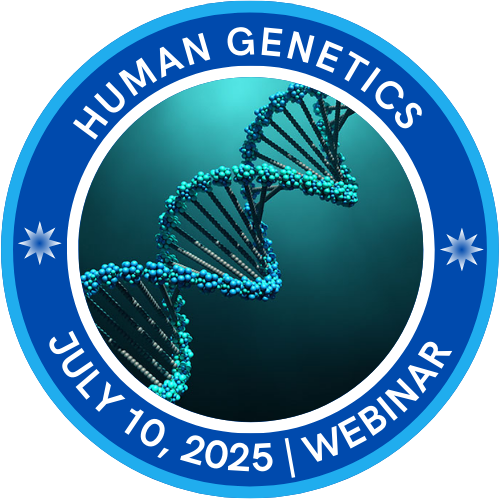Join us on July 10, 2025 for Human Genetics Webinar, bringing together leading researchers, clinicians, geneticists, and industry experts to discuss the latest breakthroughs and future directions in genetic science. This year’s Theme, "Advancing Genomic Medicine: Innovations and Ethical Frontiers," will explore cutting-edge research in genomics, personalized medicine, gene therapies, and the ethical implications of genetic advancements. Dive into discussions on hereditary diseases, genetic counseling, precision medicine, and the transformative role of genetics in healthcare. Don't miss this opportunity to engage with global experts and contribute to the future of human genetics!
Human genetics is a dynamic and rapidly advancing field that lies at the heart of understanding the biological underpinnings of health, disease, and human diversity. By exploring the intricate blueprint of life encoded in our DNA, researchers are uncovering the mechanisms behind inherited traits, genetic variations, and the molecular pathways that influence development, aging, and susceptibility to diseases. This knowledge is transforming medicine, enabling more precise diagnostics, targeted therapies, and proactive approaches to disease prevention.Recent breakthroughs in genomic technologies, such as next-generation sequencing and CRISPR-Cas9 gene editing, have revolutionized our ability to decode the human genome and manipulate genetic material with unprecedented precision. These tools have opened new frontiers in addressing hereditary disorders, rare genetic conditions, and complex multifactorial diseases like diabetes, cardiovascular disorders, and cancer. Additionally, the rise of precision medicine has allowed healthcare providers to tailor treatments based on an individual’s genetic makeup, optimizing outcomes and minimizing adverse effects.

The human genetics market is expected to experience significant growth from 2025 to 2035, driven by technological advancements, personalized medicine, and increasing investments in genetic research. The global gene editing market, valued at $5.1 billion in 2022, is projected to reach $16.2 billion by 2030, growing at a CAGR of 15.6%. Similarly, the genetic testing market, estimated at $22.3 billion in 2024, is expected to reach $65.5 billion by 2035, with a CAGR of around 10.3%. The whole genome sequencing market is set to grow from $2.63 billion in 2025 to $13.62 billion by 2035, at a CAGR of 17.9%. The global gene therapy market, valued at $2.4 billion in 2024, is anticipated to grow at a CAGR of 19.25% through 2035. Meanwhile, the cell and gene therapy market, currently worth $20.5 billion in 2024, is expected to reach $128.8 billion by 2035, representing a CAGR of 18.2%. The CRISPR and Cas gene market is forecasted to expand from $3.99 billion in 2024 to $4.85 billion in 2025 at a CAGR of 21.7%, reaching $10.81 billion by 2029 with a CAGR of 22.2%. The biologics market, projected to grow from $450.2 billion in 2025 to $1,077.2 billion by 2035, will expand at a CAGR of 9.1%. These projections highlight a rapidly growing industry, with genetic technologies becoming increasingly integral to healthcare, drug development, and precision medicine.